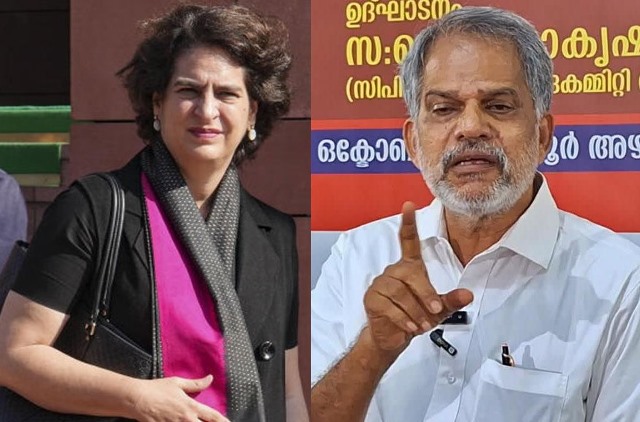The political storm stirred by CPI(M) Politburo member A. Vijayaraghavan’s recent accusations against the Gandhi family has brought forth allegations of communal appeasement by the Congress party. His claim that Rahul and Priyanka Gandhi’s electoral victories in Wayanad were achieved through Muslim vote appeasement is fueling a heated debate. The allegations, while not entirely new, have now been voiced with more conviction, accusing the Gandhi family of leveraging minority communal support for electoral gains.
Vijayaraghavan’s statement is a significant development in Indian politics, particularly because it directly targets the Gandhi family, a political dynasty central to Congress’s legacy. He alleges that the Congress’s decision to field Rahul Gandhi in Wayanad during the 2019 Lok Sabha elections was driven by the seat’s high Muslim population. Furthermore, Priyanka Gandhi’s recent actions, such as carrying a bag dedicated to Palestine in Parliament, are described as deliberate attempts at Muslim appeasement. These moves, according to the CPI(M) leader, were orchestrated under the influence of the Indian Union Muslim League (IUML), a Congress ally in Kerala.
Rahul Gandhi’s decision to contest from Wayanad in 2019 indeed marked a strategic shift. Facing a tough challenge from BJP’s Smriti Irani in Amethi, Rahul Gandhi chose a safe constituency in Kerala with a significant Muslim voter base. This was not unprecedented; in the past, Indira Gandhi had contested from South Indian constituencies like Chikmagalur and Medak, demonstrating the Congress party’s history of seeking safe seats to secure electoral victories. However, the choice of Wayanad, with its religious demographics, has become a focal point for criticism.
The Congress-IUML alliance has long been a cornerstone of Kerala’s United Democratic Front (UDF) politics. This partnership, initiated during the tenure of former Kerala Chief Minister K. Karunakaran, has ensured Congress a significant share of Muslim votes in the state. The IUML, with its stronghold in constituencies like Malappuram and Ponnani, has consistently delivered electoral dividends to the Congress. In return, the Congress has supported IUML’s ambitions, such as facilitating its victory in the Ramanathapuram seat in Tamil Nadu during the 2019 elections.
The allegations of communal appeasement, however, extend beyond political alliances. Vijayaraghavan’s claim that extremist elements were present at Priyanka Gandhi’s rallies is a serious charge. While no substantial evidence has been provided to back this assertion, it adds another layer to the narrative of communal politics surrounding the Gandhi family. The CPI(M) leader’s statement reflects the competitive nature of Kerala’s political landscape, where the Congress-led UDF and the CPI(M)-led Left Democratic Front (LDF) vie for dominance.
The Gandhi family’s critics argue that their political strategies have consistently involved leveraging minority support. In Wayanad, where Muslim votes are less fragmented due to the absence of significant regional competitors or parties like AIMIM, the Congress could consolidate its position. This electoral calculation, combined with the Congress’s longstanding association with the IUML, is viewed as evidence of communal appeasement by opponents.
Priyanka Gandhi’s symbolic gesture of carrying a bag dedicated to Palestine has also been interpreted as catering to Muslim sentiments. In the context of Kerala, where public sentiment often aligns with global Muslim issues, such acts resonate with a particular voter base. Critics, however, see this as opportunistic politics rather than genuine solidarity. They point to instances like the naming of Gaza Street in Kasargod district as indicative of a broader trend of political gestures aimed at appeasing the Muslim community.
The Congress party’s response to these allegations has been defensive, with leaders dismissing them as baseless. The party contends that its alliance with the IUML is rooted in shared secular values rather than communal considerations. However, the growing perception of communal politics, fuelled by leaders like Vijayaraghavan, poses a challenge to the Congress’s narrative. The BJP and CPI(M), as political opponents, have seized this opportunity to question the Congress’s commitment to secularism.
Kerala’s political history adds context to this debate. The state has witnessed a unique blend of political alliances and religious dynamics. The UDF’s inclusion of IUML reflects the Congress’s recognition of Kerala’s diverse electorate. However, this inclusivity is now being framed as opportunistic by rivals who accuse the Congress of compromising secular principles for electoral gains.
The controversy also highlights the evolving nature of Indian politics, where allegations of communalism are weaponized to discredit opponents. The CPI(M)’s attack on the Congress underscores the competitive and polarized political environment in Kerala. With the 2024 Lok Sabha elections approaching, such accusations are likely to intensify as parties seek to consolidate their support bases.
For Congress, the challenge lies in countering these allegations without alienating its traditional voter base. The party’s reliance on alliances like the one with IUML reflects the complexities of coalition politics in India. However, these alliances come under scrutiny when framed as evidence of communal appeasement. The Gandhi family, as the face of the Congress, bears the brunt of these criticisms, with their actions and decisions being dissected for political motives.
The broader question arising from this controversy is whether India’s political discourse is becoming increasingly polarized along communal lines. Allegations like those made by Vijayaraghavan risk deepening divisions and undermining the principles of secularism. Political parties must navigate these challenges carefully, balancing the demands of electoral politics with the need to uphold democratic values.
In conclusion, the allegations against the Gandhi family by CPI(M)’s Vijayaraghavan have sparked a significant debate about the role of communal considerations in Indian politics. While the Congress-IUML alliance and the choice of Wayanad as a constituency can be seen as strategic, framing these decisions as communal appeasement reflects the contentious nature of political discourse. The Gandhi family’s critics view their actions as opportunistic, while the Congress defends its alliances as inclusive and secular. As India approaches another election cycle, these debates will likely shape the narrative, highlighting the complexities and challenges of coalition politics in a diverse democracy.
(The writer is a technocrat, political analyst, and author. He covers national, geopolitical, and social issues. The views expressed are his own. His social media handle is @prosenjitnth)
